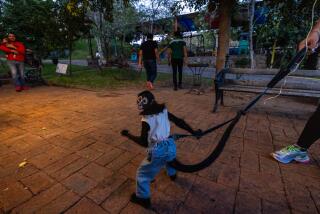Studying a People Full of Contradictions : THE SPEARS OF TWILIGHT: Life and Death in the Amazon Jungle, By Philippe Descola, Translated from the French by Janet Lloyd; New Press; $25, 504 pages
- Share via
One can’t read French anthropologist Philippe Descola’s account of his three years with the Achuar tribe of eastern Ecuador without marveling at human beings’ ability to make life complicated.
Devotion to the arcane Western religion called science led Descola and his fiancee, Anne Christine, to risk their lives among the Achuar--former headhunters and headshrinkers still renowned for their bloody intra-tribal vendettas.
From 1976 to 1978, the couple learned their hosts’ language, mastered intricate codes of etiquette, ate raw tobacco and monkeys’ paws, drank manioc beer, took hallucinogens, made long journeys on foot and by canoe, studied the methods of shamans, endured hardships that, in the best ethnographic tradition, they mention only in passing--all for the sake of the thousands of pages of notes that became this book.
Meanwhile, devotees of another Western faith were working just as hard to convert the Achuar to Christianity. Catholic missionaries had been trying to do this since the days of the conquistadors. More recently, Protestant fundamentalists “armed with unshakably clear consciences” and “a few articles of morality accepted in the rural America of their childhoods,” not to mention airplanes and portable generators, had made minor inroads.
As for the Achuar themselves--a sub-tribe of the Jivaro group, scattered thinly over an area the size of Portugal in the eastern foothills of the Andes--their seemingly simple life of hunting, fishing and gathering embodied complexities that Descola admits he came to understand only sketchily.
Descola, a disciple of Claude Levi-Strauss, discovered that the inhabitants of Ecuadorean frontier towns, even the neighboring tribes that traded with the Achuar, knew almost nothing about them. And what they did know was a mishmash of scare stories that had been recycled back and forth between the New World and the Old for centuries.
The Achuar’s “sinister reputation,” he says, obscured the fact that they had stopped headhunting generations ago and had even forgotten that they were headhunters, thanks to the lack of interest in the past that is a notable aspect of their culture.
His only clues: fragments of poetry that corresponded with ceremonies still performed by other Jivaro tribes that had abandoned the practice more recently.
In his zeal to substitute verifiable fact for the tales long circulated by “travelers in search of exotic adventure,” Descola knowingly lived out an adventure of his own--the adventure of learning a radically different way of experiencing the world--even as he observed the drama of murder, revenge and abduction among the Achuar.
Anthropology, he concedes, is an inexact science. Like the efforts of the missionaries, it’s all too easily contaminated by the prejudices and assumptions the researchers bring with them.
*
The value of “The Spears of Twilight” lies not just in what it is--a vivid narrative that makes Descola’s adventure ours as well--but in the kinds of books about Native Americans that it isn’t.
It isn’t a book about disease-ridden, benighted savages in sore need of civilizing. Nor, on the contrary, is it a standard lament for helpless rain-forest dwellers about to be crushed by civilization. The Achuar as Descola sees them are tough and adaptable--and full of contradictions.
Achuar, who have never seen a white person, trade for rifles, machetes, transistor radios and Hawaiian shirts. In crowded, polygamous households, they practice modesty and reserve. Amid abundant food supplies, they restrict their diet with multiple taboos. They view a seemingly innocuous activity like gardening as a perilous exchange of vital essences with bloodsucking plants. Though constant violence destabilizes their society, it also gives their egalitarian individualism full play--no true chiefs, no hereditary status.
In the end, none of this seems particularly strange. The Achuar simply complicate their lives in different ways than we do with the excess brain power not needed for survival. They aren’t “just like us,” or disgustingly primitive, or shining examples of virtues that civilization has stripped from us--but they are recognizably and fully human. Learning about them, we enlarge our idea of what the human can be.
More to Read
Sign up for Essential California
The most important California stories and recommendations in your inbox every morning.
You may occasionally receive promotional content from the Los Angeles Times.













